|
|
|
 |
| By Kimberley Rew |
Robyn
Hitchcock arrived in the medium-sized college town of
Cambridge, England in 1975 to look for musicians for
his band—not an obvious choice of location as a hotbed
of talent but none of this would apply if he hadn't.
I first heard him at some weekly informal musical get-togethers
at the Great Northern Hotel run by a man called Sunshine
Joe, with a backing band he later described as 'people
who were living in my house'. Robyn wore black leather
trousers and jacket, long hair and beard, and either
glowered at the audience or, then as now, launched into
lightningly impromptu song introductions which took
the subject matter on a season ticket to Unexpectedsville. |
| Morris
Windsor, Kimberley Rew, Robyn Hitchcock, Matthew Seligman |
|
| |
|
| At
the time I was renting a room in a terraced house
whose basement contained Spaceward recording studio.
Robyn arrived and recorded and we met in the kitchen
where he stubbed his fag on the lino and was rebuked
by recording engineer Mike Kemp. Mike subsequently
invented the 'Sadie' hard disk recorder and retired
to the Algarve. Morris Windsor, Rob Lamb (and original
Waves singer Rob Kelly) were in local rock outfit
Mad Hatter whom I heard at a cricket pavilion on
one of those balmy summer night college shindigs.
Rob and Morris went on to form Sheboygan (which
I thought for a long time was a quote from Surfin'
USA, but then found was a generic name for 'Nowheresville')
and discovered pub-rock. The next year, 1976, in
pursuit of a 'white soul' style, they teamed up
with Robyn and Andy Metcalfe to form Dennis and
the Experts and began to rehearse in Robyn's front
room. Uneasy about the way things were shaping,
in December Rob quit (subsequently forming the respected
Ducks on the Wall, whose Adrian 'Hots' Foster gave
us the phrase 'I've got the hots for you'). Except
Robyn was in bed at the time so he had to shout
his resignation thru the keyhole. |
|
|
| |
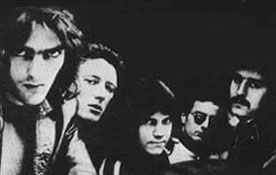 |
Dennis
and the Experts were booked that month for a university
Christmas ball—recruiting Alan Davies on guitar, Robyn
arrived at the venue, which being an educational institution
had a blackboard, that night being used to list the evening's
musical program. Erasing 'Dennis and the Experts', he
chalked in 'The Soft Boys'. Thus were they born. Now began
the group's truly formative year. All the distinctive
musical ingredients were brewed—incisive lyrics, unexpected
twists (at least few expected twists), the twin guitar
attack. There was a vague feeling among the local musos
that it wasn't 'proper' music—proper music at the time
was more a swamp of 'tasteful' licks at the pinnacle of
which, if swamps have pinnacles, was Steely Dan. |
Nobody
of course ever actually could play like Steely Dan, but
that distant peak was always in view. Certainly it was
hard to hear the subtleties of the Soft Boys through the
group's two 4x12 WEM columns. That all changed with the
appearance of the EP Give it to the Soft Boys on
Raw Records, run by local entrepreneur Lee Wood, that
summer of 1977. There was 'Wading thru a Ventilator' in
all its glory, lyrics originally aimed at Robyn's neighbour
Vyrna Cole now turned in upon himself, the rising guitars
of the middle eight raising hair on arms. |
|
| |
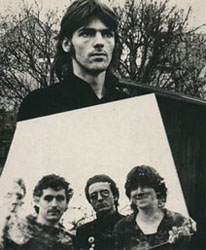 |
|
The
Soft Boys began to get second-on-the-bill gigs in London,
supporting among others the Pirates, Elvis Costello, and
the Vibrators, where they met long-term producer Pat Collier.
I joined in January 1978, having baby-sat and sat in the
previous month. We signed to the short-lived Radar Records,
who had Costello and Nick Lowe and were thus considered
the last word in cool. (This is the only time in my life
I have 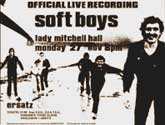 ever
been cool and then only by association). We opened for
the Damned—the only time in my life I have ever attended
a punk gig. Radar financed an album to be made over two
weeks at the residential Rockfield studios on the Welsh
border. But the coolness was already returning to room
temperature and the album was mothballed, followed shortly
by the rest of the record company. ever
been cool and then only by association). We opened for
the Damned—the only time in my life I have ever attended
a punk gig. Radar financed an album to be made over two
weeks at the residential Rockfield studios on the Welsh
border. But the coolness was already returning to room
temperature and the album was mothballed, followed shortly
by the rest of the record company. |
|
|
|
    |
| This
was the time when the nation limped half-heartedly
after punk—it was not the glittering golden age
that it was later labelled. Gigs in Swansea, Leeds
and elsewhere were attended by small numbers of
punks who had a miserable time (but if you were
a punk that of course meant you had a great time
because the object was to be miserable). It was
also the time of Supertramp's 'Logical Song' and
Dire Straits' 'Sultans of Swing', which were played
incessantly at ear-melt volume in these joints,
and which I never want to hear again. Bands such
as Squeeze and the Police, who had been 50p on
the door at the Hope and Anchor when we were charging
75p, whizzed past at 100mph. |
|
|
| |
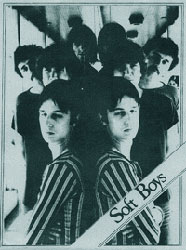 |
| Robyn
put up the cash to record A Can of Bees independently
at Spaceward on his own Two Crabs label. After the
album's quiet reception and some more recording
of songs like 'When I Was a Kid' and 'The Asking
Tree', Andy left to team up with Telephone Bill
and the Smooth Operators in summer 1979. Also taking
the opportunity to quit were harmonica player Jim
Melton, sound engineer Ivan Carling, and lighting
man Mungo Carstairs. This left the skeleton of Hitchcock,
Windsor, Rew and new bass player Matthew Seligman.
Matthew was a respected local player—my girlfriend
Lee used to listen with her head in his bass cabinet.
Oddly at the time no one could drive. I passed my
driving test and the day after ferried the gear
down to London's Rock Garden (the first place I
saw the phrase 'coffee-table album') in a borrowed
Volkswagen van. The handbrake didn't work but if
you took your foot off the gas it stalled. So if
you stopped on a hill you had to either balance
the van on the clutch or theoretically stay there
for ever. |
|
| |
|
 |
| We
returned to Spaceward and recorded 'I've got the
Hots', 'He's a Reptile', 'Song Number Four' and
'You'll Have to Go Sideways'. This last consisted
simply of a guitar riff repeated over and over for
three minutes. The studio owned a Mini Moog synthesiser,
then costing some £600 (a vintage Stratocaster
was £300). I prevailed on engineer Mike Kemp
to let me plaster the multitrack with one-finger
Moog (they'd just gone 16-track). This was the first
and probably last time anything of the sort was
attempted. The Cambridge City Rowing Club Boathouse
now became available for band rehearsals—the second
Cambridge outfit to use it were the Dolly Mixtures,
who later achieved fame backing Captain Sensible.
It was an unloved building, curtains terminally
adrift from their plastic rails, sandwiched between
much swankier structures belonging to the historic
colleges. Day after day we would meet there to work
on the songs that eventually became the Underwater
Moonlight album, plus efforts such as Goodbye
Steve (whose words changed completely with every
rendition), which were dug up for the 2001 bonus And How It Got There disk, before retiring
to Hambis' cafe where egg and chips were 40p. Hambis'
house rules were No Schoolboys and No Chips Alone.
A local character dubbed The Face of Death (who
had inspired that song and was now indeed dead)
had redecorated the joint and it was thought, rather
cruelly, that one corner where the dado plunged
alarmingly floorwards was where he had actually
expired. |
|
|
   |
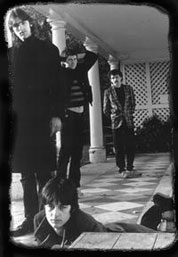 |
As
the new decade began we ventured to Pat Collier's
4-track Alaska studios, located in a dripping
tunnel near London's Waterloo station—still there,
with the same cigarette burns on the same sofa.
(It's long since gone 24-track, stopped dripping,
and has been home to many hit recordings). This
was a one-man operation in the truest sense, i.e.
there were other employees but they didn't actually
do anything. Pat would frequently record the band
in filthy overalls (Pat, not the band), having
just installed a false ceiling or something. A
welcome feature was the La Ronde across the street
where one could get nourishing bread pudding—this
was later demolished to make way for the Jubilee
Line tube extension (the La Ronde not the bread
pudding). We recorded 'Queen of Eyes', 'Kingdom
of Love', and 'I Wanna Destroy You' (please note
this last is a parody of punk, not punk itself). |
|
|
|
    |
 The
first stirring of suspicion of the group's worth
independently of the media hooha of two years
previously came with the appearance in our career
of the tiny Armageddon label, who put out the Kingdom of Love EP, which crept to about
25 in the New Musical Express 'alternative' charts.
Increasing our crew to one with Howie Gilbert,
we embarked on a tour of Scotland, staying in
a 'family room' with five beds in an Edinburgh
hotel. This was connected by intercom to the front
desk. Being asked in the morning if there were
still five of us, Robyn, whose bed was nearest
the intercom, replied 'no, one of us has had a
baby'. It was felt that the forthcoming album
needed technical beefing and we switched to the
8-track James Morgan studio. It was in James Morgan's
house, in a street in a South London neighbourhood
which to this day I have never been able to find
again. Here we put down 'Insanely Jealous', 'Underwater
Moonlight', 'Positive Vibrations' etc. The
first stirring of suspicion of the group's worth
independently of the media hooha of two years
previously came with the appearance in our career
of the tiny Armageddon label, who put out the Kingdom of Love EP, which crept to about
25 in the New Musical Express 'alternative' charts.
Increasing our crew to one with Howie Gilbert,
we embarked on a tour of Scotland, staying in
a 'family room' with five beds in an Edinburgh
hotel. This was connected by intercom to the front
desk. Being asked in the morning if there were
still five of us, Robyn, whose bed was nearest
the intercom, replied 'no, one of us has had a
baby'. It was felt that the forthcoming album
needed technical beefing and we switched to the
8-track James Morgan studio. It was in James Morgan's
house, in a street in a South London neighbourhood
which to this day I have never been able to find
again. Here we put down 'Insanely Jealous', 'Underwater
Moonlight', 'Positive Vibrations' etc. |
|
    |
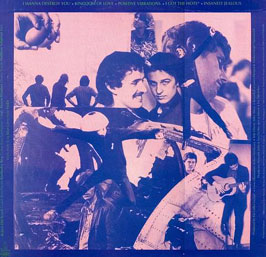 |
|
| The Underwater Moonlight album appeared
in summer 1980. By this time the band had
already moved to London and Robyn had recorded
'The Man Who Invented Himself'. Things were
changing. 'Only the Stones Remain' was probably
our last solid studio effort, eventually
appearing on the posthumous half-live Two
Halves For The Price Of One budget-priced
album, but we never really found a decent
place to rehearse in North London. One attempt
was in the basement of a house occupied
by an emigré Scottish heavy metal band.
This, like that hotel room, was connected
by intercom to the living room upstairs.
Morris played his usual kit but, during
a break, was tempted over to the heavy band's
kit because it had 14 million tom-toms.
He immediately received a protest on the
intercom from an irate Scottish drummer. |
|
|
    |
The
group was however yet to embark on its biggest single
adventure—a trip to New York, staying at the Iroquois
on 44th Street, playing at such places as the Danceteria,
the Mudd Club and Maxwell's in Hoboken, the only place
in the world where I've appeared with the old Soft Boys,
the new Soft Boys, Katrina and the Waves, Robyn Hitchcock
solo, and myself solo. We returned, as you often do
from New York, at six in the morning, somehow bringing
a New York band, the Method Actors, with us, sitting
opposite them on the rattling tube. Once through the
front door I retired to bed due to lack of funds. |
|
|
| |
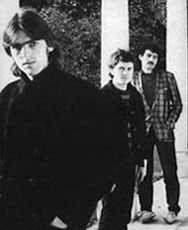 The
group's last show was at second-league pub venue the
Golden Lion, Fulham, London in February 1981. Unknown
to us we were already 'influencing' some younger American
musicians. Many adventures followed over the next nineteen
years but what mainly happened to the Soft Boys was
that the Underwater Moonlight album became 'legendary',
reappearing on Rykodisc in 1992 with a host of extra
tracks. Its subsequent unavailability perhaps fueled
the mystique until 2001 when Matador picked up the baton.
Robyn was on his second post- The
group's last show was at second-league pub venue the
Golden Lion, Fulham, London in February 1981. Unknown
to us we were already 'influencing' some younger American
musicians. Many adventures followed over the next nineteen
years but what mainly happened to the Soft Boys was
that the Underwater Moonlight album became 'legendary',
reappearing on Rykodisc in 1992 with a host of extra
tracks. Its subsequent unavailability perhaps fueled
the mystique until 2001 when Matador picked up the baton.
Robyn was on his second post-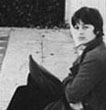 Egyptians
album, Morris was working with the Gliders, Matthew
was finishing the first Snail offering, and I had completed
eighteen years with Katrina and the Waves. Several reunions
happened at the Feghorn pub in Central London's last
surviving neighbourhood of Clekenwell, topped off by
an appearance at Matthew's wedding reception in Kensal
Green. It felt like the next booking the week after
the Golden Lion. Kensal Green saw the debut of 'Sudden
Town' and it soon became clear that Hitchcock was not
the man simply to dust off relics, but always thinking
in terms of the next new song. First, however, came
the picking up of the transatlantic thread—a month in
Spring 2001 across the USA, the natural extension to
the 1980 New York trip, culminating at San Francisco's
Fillmore. Egyptians
album, Morris was working with the Gliders, Matthew
was finishing the first Snail offering, and I had completed
eighteen years with Katrina and the Waves. Several reunions
happened at the Feghorn pub in Central London's last
surviving neighbourhood of Clekenwell, topped off by
an appearance at Matthew's wedding reception in Kensal
Green. It felt like the next booking the week after
the Golden Lion. Kensal Green saw the debut of 'Sudden
Town' and it soon became clear that Hitchcock was not
the man simply to dust off relics, but always thinking
in terms of the next new song. First, however, came
the picking up of the transatlantic thread—a month in
Spring 2001 across the USA, the natural extension to
the 1980 New York trip, culminating at San Francisco's
Fillmore. |
|
 |
| The
group reconvened in Pat Collier's new Gravity Shack
studios in South London to record a contribution
to a Tribute to Paul McCartney album, which developed
into the Nextdoorland album sessions. The
leftover songs were assigned to a CD EP called Side
Three. The bread puddings were replaced by cheese
and bean wraps and sushi, which always looked to
me suspiciously like party nibbles. Punk metal dirges
from the next studio were replaced by the dim thud
of electronic beats through the floor from a warren
of 'programming rooms'. To keep in shape there were
gigs at Evershot village hall in Dorset, the Victoria
and Albert museum (strangely) and, very satisyingly,
opening for the Pretty Things on the South Bank,
including a version of 'Astronomy Domine' with stereo
Barrett guitar from Robyn and Pretty Things' special
guest Dave Gilmour. At the time of writing, September
2002, the Soft Boys are about to embark on a second
American tour to celebrate Nextdoorland—'not bad
for a reunion album', commented Nigel Cross. Happy
listening and thank you all for helping to make
the Soft Boys a major experience of my life. |
|
|
|
|
|
|